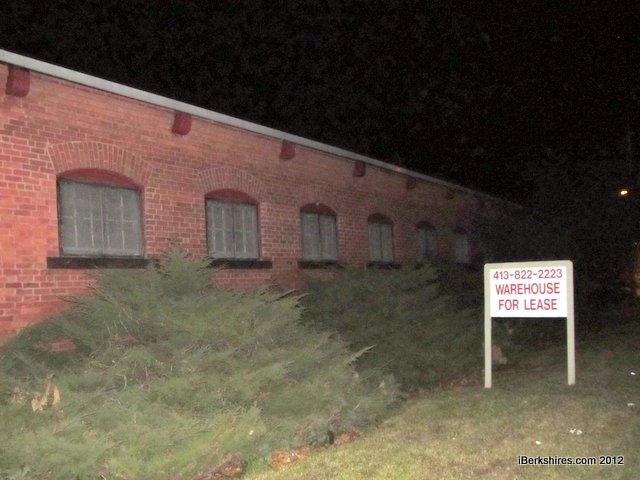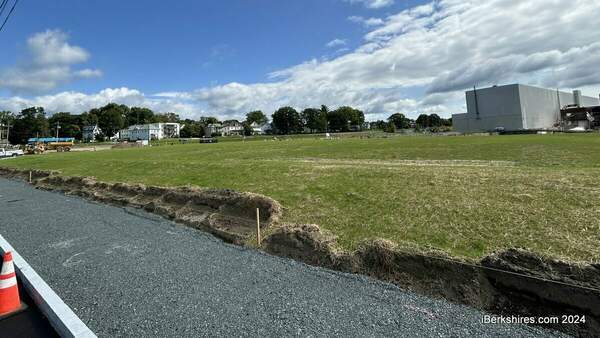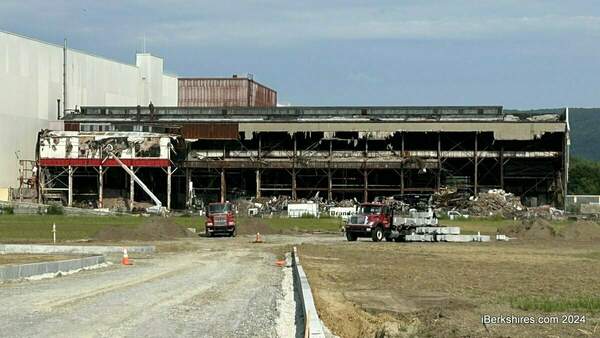
Pittsfield Residents Mount Fierce Opposition Against Warehouse Demo
 |
|
 |
Councilors and residents crammed into Monday's Historical Commission meeting, feeling they had been mislead about the fate of a former Crane warehouse on Dalton Avenue. |
PITTSFIELD, Mass. — Sparks flew at an uncharacteristically crowded meeting of the Historical Commission on Monday as residents, including a majority of city councilors, voiced strong disappointment with a proposal to demolish a Dalton Avenue building that once housed raw materials for Crane & Co.
In addition to concerns about the historic value of the property, which is facing a demolition application by Freight House Realty, members of the City Council said they felt mislead by the company when it sought and was granted a zoning change for the 999 Dalton Ave. location late last year.
"We were lead along, I feel," said Councilor Kevin Morandi, of the presentation made by James Scalise of Freight House Realty, in which it was indicated that the existing building would be renovated for reuse. "I was sold on this, and because of this, not because of the building being taken down, or I would never have voted for this."
The Historical Commission heard similar opposition echoed from other councilors present, including Christine Yon, Christopher Connell, Churchill Cotton, Paul Capitanio and Anthony Simonelli, as well as several residents who asked the commission to vote against the application.
Under an ordinance enacted in 2007 following the near demolition of the Samuel Harrison house, set to open as a historic museum this summer, the commission can request that the city's Community Development Board uphold a six-month delay on demolition applications for any building that meets criteria as a historic site. Since then, the commission has sought a delay only one other time, in response to a demolition request for the former Plunkett School last year.
Scalise, however, told the commission that the delay was inappropriate in this case, and described the building as lacking major historical value aside from the 84-year-old age of the structure.
"Zenas Crane didn't ever sleep here," said Scalise, added that in the months since he went before the Community Development Board and City Council to request a re-zoning of the location, subsequent discussions with prospective retailers had lead Freight House Realty to conclude that renovation of the building was not economically viable.
"I don't think there's anyone in this room who likes this building more than I do," Scalise said, "The fact of the matter is that after a lot of homework as a local engineer on what the redevelopment alternatives for this project are, and also in working with a developer who's making an offer on the property, none of the alternatives that have been offered to me allow its reuse."
Scalise told the commission that because it has only been a warehouse space for raw materials, the building has never had a potable water source, heating or other such infrastructure and that the cost of redevelopment would be prohibitive to most retailers likely to take an interest in locating there.
Several of the city councilors expressed skepticism as to why this information had not been made part of the presentation to them in December, which specifically indicated that "the existing brick building will be renovated into business commercial uses which includes office and retail space."
"For him to come here now and say it's not it's not cost effective at this point, I'm sorry, I think that's his mistake. We were sold a misconcept," said Connell. "I don't believe he did his due diligence."
Yon, who represents Ward 1 where the building is located, said her vote to approve the amendment to the city's zoning map was based on the sentiments of neighbors who were enthusiastic about the revitalization of the current building.
"They gave me their blessing to go ahead and support this zoning change based on the fact that they were very excited that this building would be reused," Yon told the commission. "Mr. scalise is an engineer. He must know when he puts a proposal like this forward, the dollar cost involved in something like that, even if it was conceptual."
"I was sold on just the fact that we were going to keep that building, and that's the reason I voted for it," agreed Capitanio.
In response to why demolition of the building was never presented as a possibility, Scalise said it was not until discussions began with potential developers that he found it was not a cost they were inclined to take on.
"I didn't realize that the retail developers who could afford to do it wouldn't do it," said Scalise, who also expressed regret that he had not mentioned last year that demolition of the site might be an option.
"I never imagined in my wildest dreams that the only reason people voted for this zone change was made was because people wanted to save the building. The master plan is why zoning changes are mad," Scalise responded. "I wasn't trying to pull a fast one."
|
The commission recommended a six-month delay on the demolition. |
Proponents of preserving the building also maintained that while Zenas Crane may not have slept there, the building possessed significance as part of the broader local history of Crane & Co., and as part of the historic and aesthetic corridor linking Pittsfield with neighboring Dalton.
"The freight house, which was built in 1929, is definitely part of the Crane history," said Pittsfield resident and former Crane employee Mary Ward, who implored the commission to "look outside the box" in their determination. "That is a building that is historical."
"It is part of the national and international story of paper making that dates back to the Revolutionary War, even if it only stored cotton," said Yon. "Crane has continually supplied the U.S. Treasury with currency since 1879. That's a 134-year history."
Under the city ordinance, a building meets the criteria for delay of demolition if "the structure is importantly associated with one or more historic persons or events, or with the broad
architectural, cultural, political, economic or social history of the city, the Commonwealth of Massachusetts or the United States of America."
"Historic heritage is the key to economic development," added Pittsfield resident Donna Walto. "We cannot afford to lose any more of our historic buildings."
Cotton opined that the purpose of a demolition delay order was in part "to give the community a chance to find out if there is historical significance" that may not be immediately apparent.
"Oftentimes historical value is discovered through word of mouth," said Cotton, as in the case of the aforementioned Samuel Harrison house.
Based on these arguments for historic significance moreso than the dispute over the re-zoning, the commission agreed that the building merited the six-month delay, voting unanimously against the demolition request. Their recommendation will now go to the Community Development Board. Enaction of the delay does not prevent future demolition of the site beyond the six-month time frame.
"I'll wait the six months. I'll try," said Scalise, who told the commission he has already made several attempts to market the existing building, even offering discounts to various local businesses. "But it still doesn't meet the criteria. ... It still doesn't make it right."
Tags: demolition, historical building, historical commission,
















